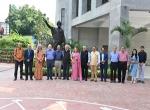Prof. Dilip K. Chakrabarti, recently awarded with the honour of ‘Padma Shree’, Professor Emeritus of South Asian Archaeology, University of Cambridge and Distinguished Fellow, VIF, gave a talk on ‘Debates on Ancient India’, as part of the VIF Lecture Series Understanding Indian History & Civilization, on 27thth February 2019.
Prof. Chakrabarti stated that the modern study of ancient Indian history was about 200 years old. In this long trajectory of study, he finds three issues particularly problematic: (1) the Aryan hypothesis; (2) the extent to which our literary texts could throw light on actual historical events; and (3) the academic suitability in the Indian context of some frequently-used European concepts and terms such as ‘feudalism’ and others.
The Aryan hypothesis has been part of the debate on ancient India for the past 200 years. Linguistics has long occupied a centre-stage in this debate. Whereas the truth is that one cannot study history through a study of languages; as such, linguistics does not have any importance in historical studies. Recently, to this trend has been added the study of DNA. Thus, we now have two disciplines—archaeo-linguistics and archaeo-genetics. The speaker thoroughly disagreed with the approach of studying history from the framework of these two disciplines. He pointed out that people are unduly obsessed with “origins”, whereas what should matter is the historical development of a certain people or society over time.
Another disturbing trend that the speaker noted was that these days, scholars like to dwell on human differences rather than human unities. Behind every genocide, he remarked, there is a perception of difference, and directly or indirectly genetic studies based on racial concepts have been instrumental in sharpening the sense of difference. Present-day academics is strengthening the feeling of difference. It is one thing to sit in Cambridge and dwell on purely theoretical issues, and it is quite another to face the consequences as a common person. What will happen in India if we start taking ethnic differences too seriously?, he asked.
Early historians of India and other scholars like R. C. Majumdar, R. C. Dutt, E. B. Havell, believed in the Aryan hypothesis (while Majumdar also emphasized on intermingling). The assertion of the famous linguist Suniti Kumar Chatterji that Harappan civilization is Dravidian had spread like wild fire. Any claims about Indian society and culture based on concepts of racial origins do not indicate anything substantial. All human groups are mixed groups. Instead, in historical terms, the speaker argued, it is the ‘land’ and the land alone that should matter for the study of historical development.
The present-day champions of the Aryan hypothesis are mostly Western Sanskritists and their Indian collaborators. However, like this group, which argues that Aryans came to India from outside, the group that argues that Aryans went out from India is equally wrong. According to Prof. Chakrabarti, the entire concept itself of Aryan as a race is a myth and scholarly construct, and should be discarded.
The second point that the speaker tried to cover is that how good is our literary evidence as historical material? Prof. Chakrabarti was a little doubtful as to how far we can go purely on the basis of texts such as Ramayana and Mahabharata to reconstruct history. These texts are virtually undatable, he said. Many manuscripts have not survived.
The third issue he picked up was that of the applicability of certain terms like “feudalism” to the post-Gupta period. Prof. Chakrabarti argued that 6th century BC onwards, the practice of donation of land to Brahmins after a ritual bath on an auspicious day existed. Inscriptions inform us about such practices right up to 16th or 17th century AD. Such practices are usually associated with earning merit. The speaker argued that Marxist historians have concocted the idea of “feudalism” in India. He further argued that state formation was in progress since a long time; so, to argue that it happened in the post-Gupta period is not convincing.
Prof. Chakrabarti said that any glorification of ancient India is looked upon by Marxist historians with suspicion and represented as a communal perspective. He said R. S. Sharma even went to the extent of writing that glorification of ancient India can upset the Muslims. Prof. Chakrabarti was equally critical of present initiatives such as ‘Bharat Vaibhav’ and so on. He lamented the fact that we do not have well-equipped archaeological laboratories in India, and argued that some amount of attention in this respect would instead go a long way in serving the cause of ancient Indian history. He noted that decades ago, when he had visited China, that country already had 23 radio-carbon dating laboratories!








We salute Prof. Dilip Chakrabarti ji for this lecture with deep insights. It has much relevance in contemporary historical studies when divisive trends occur from archaeological observations at sites like Keezhadi in Tamil Nadu. Let studies unite people beyond differences.
Post new comment